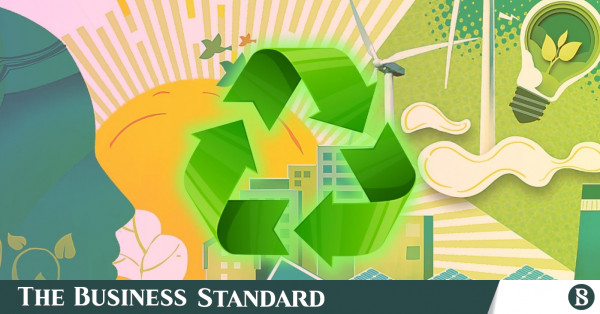Bangladesh must look beyond the RMG sector to embed sustainability across all industries. Embracing green technology, policy reforms, and cross-sector collaboration will be key to balancing growth with environmental responsibility
Illustration: TBS
“>

Illustration: TBS
As global concerns for climate change and environmental degradation rise, industries are facing mounting pressure to revisit traditional production models. The footwear industry is also adapting to the changing paradigms. It marks not just a shift in production methods, but a new conception of industrial advancement. The spread of green initiatives into an industry like this one can make consumers interested in environment-friendly products as well as yield both social and economic benefits.
In today’s world, sustainable efforts have become one of the requisites for continued growth and progress. Companies need to operate with a sense of responsibility towards nature. In order to reduce impact on the environment and raise credibility, businesses need to take up green production initiatives such as the usage of recyclable materials, conservation of energy, minimising pollution etc.
In the long run, companies with environment-friendly business models have a higher chance of sustainable competitive advantage. Besides, these green initiatives not only increase profit in a business but also create awareness among customers and society as a whole. Therefore, it’s imperative for companies to put more effort into implementing eco-friendly and sustainable initiatives.
In Bangladesh, the RMG sector has been recognised globally for its eco-friendly and sustainable initiatives. However, it’s crucial for the country’s overall development to focus on other sectors beyond the RMG. The country should also focus on implementing eco-friendly initiatives in industries such as leather, ceramics, agro-processing, and electronics.
These initiatives include developing energy-efficient and sustainable supply chains in production processes and improving waste management systems. The global demand for sustainable and responsible production has been rising rapidly. By adopting sustainable practices and environment-friendly green factories, Bangladesh can position itself as a great hub for FDI.
Strategic policy reforms and infrastructural investment are essential in order to develop environment-friendly industries. However, Bangladesh is currently facing major challenges, including the lack of green financing, limited technical expertise, an underdeveloped recycling ecosystem and the lack of comprehensive and effective policies.
In order to overcome these challenges, the focus should shift towards tax incentives for green initiatives, establishing green industrial zones, encouraging sector-specific collaboration in clean technologies, and ensuring strict enforcement and standardisation of environmental regulations.
Nowadays, people all over the world are more interested and aware of environmental issues. There’s growing concern about reducing the consumption of water and controlling industrial pollution. Zero Liquid Discharge (ZLD) can be an effective solution in this case. ZLD technology helps factories in reducing water consumption and recycling waste, which reduces pollution and prevents waste of water.
Additionally, there is a shift towards paperless transactions as well. Priority is placed on the use of e-billing systems across industries. This not only helps in environmental conservation, but it also reduces time, cost and waste. ZLD and e-billing systems are both making production as well as businesses more eco-friendly and sustainable. These technologies are necessary in order to keep our environment free of pollution and save resources for upcoming generations.
Some companies in Bangladesh have already set great examples regarding sustainable practices. Among these companies, Bata is exemplary. For its contribution to the protection of the environment and workers’ safety, Bata received the “Green Factory Award” in 2023. The award was given for its environment-friendly production processes, use of energy-efficient and water-efficient technologies and its initiatives for providing a safe working environment for its employees and workers. ZLD technology has been introduced into Bata’s manufacturing process, which reduces the consumption of water and pollution.
Additionally, they have also introduced a digital billing system. It has reduced the use of paper significantly, which has positively impacted the environment. These initiatives have positioned Bata not only as a shoe manufacturing company but also as a leading organisation in terms of sustainability and labour welfare. The company has set a standard for others in the industry.
Globally, these environment-friendly practices and sustainable development initiatives are expanding rapidly. However, nobody alone can expedite this revolution. Cooperation of different stakeholders is of the utmost necessity. For instance, to spur innovation and transition towards more eco-friendly practices, corporations must collaborate with research and technology institutes.
It can result in the creation of new technologies, the utilisation of recycled resources and the implementation of energy-efficient innovations. The blend between technology, business and research is crucial for creating a more sustainable and eco-friendly business environment.
We are living in a world where sustainable development is no longer optional; it’s ingrained in our lives. For that, long-term environmental objectives need to be realised through cooperation between industries, governments and research centres. By encouraging green technologies, innovation and policy support, the public and the private sector can contribute to developing an environment-friendly industrial sector.
Sketch: TBS
“>

Sketch: TBS


